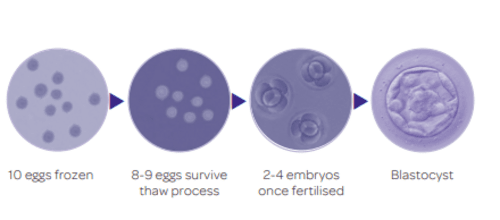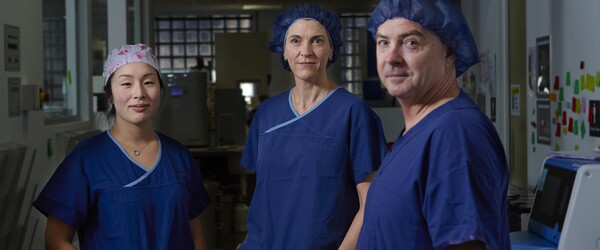Egg freezing
If you’re not quite ready for parenthood, or still haven't met that special someone, have you thought about putting your eggs on ice?
When it comes to female fertility, timing is the most important factor, and being proactive can make a big difference in your chance of conceiving later in life.
What is egg freezing?
Egg freezing is a method of storing a woman’s unfertilised eggs to allow her to try to conceive at a later date, when natural conception would be unlikely. It may be seen as a way of preserving the possibility of fertility for women who are not in a position to become pregnant straight away, or whose fertility is at risk for medical reasons such as cancer treatment.
Frozen eggs may be stored for many years without significant deterioration. When the woman is ready to use her eggs, they are warmed, and then fertilised with sperm. The aim is for the fertilised egg to develop into an embryo, which can then be transferred to the woman’s uterus giving a chance of pregnancy.
What is the egg freezing process at IVFAustralia?
View the step-by-step process below.
Below is the full breakdown of egg freezing costs at IVF Australia.
Service Cost Notes Initial Consultation with a Fertility Specialist Consult fees vary based on the Specialist you select – ranging from $250 upwards, and Medicare Rebate of $80.85 available (with valid referral & Medicare eligible). *Bring a referral for a partial Medicare Rebate. Elective Egg Freezing Cycle Fee $5,278 *Includes cycle management, surgeon’s fee, and initial freeze. Day Hospital, Bed Fee & Anesthetist fee Approx. $1,995 Medications Starting from $1,500 *These are a separate cost, payable to the pharmacy. Egg Storage $275 per six months *Storage Fee Separate Cost
Costs may vary subject to individual circumstances and there may also be costs for preliminary tests such as blood tests and an ultrasounds.
Medicare and egg freezing
It’s important to note, currently Medicare and other government subsidies only apply to medical fertility preservation. During your initial consultation, your fertility specialist will explain the difference between medical fertility preservation and elective fertility preservation and discuss which would be relevant to you.
Egg freezing payment plans
Learn more about our flexible payment plan options. We’ve partnered with Zip Money to help spread the cost of fertility treatment. With a 12 and 24-month interest free period and flexible payment options, you can choose what works for you.
Egg freezing success rates
The chance of a live birth from frozen ‘vitrified’ eggs is similar to the chance from ‘fresh’ eggs which are usually used in IVF treatment. The two most important factors that determine the chance of having a baby from frozen eggs are your age when your eggs are frozen and the number of eggs that are stored. Currently, we expect the following success rates for egg freezing:
- for a woman aged 35 or under, one stimulated cycle would result in the collection of 10 – 13 eggs of which 7 – 10 would be suitable for vitrification and storage
- Approximately 80-90% of eggs would survive warming in the future
- Approximately 50-80% of surviving eggs would fertilise
- Approximately 80-90% of fertilised eggs would develop into embryos
- A single embryo would have a 20-35% chance of developing into a pregnancy
Success rates are lower for women over 35, which is why we recommend preserving your fertility sooner rather than later. If you're over the age of 38, egg freezing may not be a suitable avenue. However, there are more immediate options that can be explored such as the use of donor sperm.
We always recommending speaking to a fertility specialist to better understand if egg freezing is an option for your particular circumstances.

For more information on egg freezing in Victoria, Queensland or Tasmania, please visit our sister clinics' pages below:
Melbourne IVF | Queensland Fertility Group | TasIVF
Egg freezing FAQs
Can you test your fertility potential now?
The expected success of egg freezing can be ascertained from an initial assessment of the ovarian reserve using a blood test for Anti-Mullerian Hormone (AMH) and an ultrasound scan of the ovaries and uterus. The AMH test can provide insight into the number of eggs remaining, although it does not give information about the quality of the eggs.
This will help guide your fertility specialist to determine if egg freezing is right for you.
Can you freeze your eggs if you have a low AMH?
If you have a low AMH, your fertility specialist will discuss if egg freezing a good option for you. Although the AMH test can provide insight into the number of eggs remaining, it does not give information about the quality of the eggs. Your fertility specialist will take into consideration the results of the AMH test, your age and other individual factors before recommending egg freezing.
How much does it cost to freeze your eggs?
In Australia, Medicare and other government subsidies are currently only payable for fertility treatment when there is a medical indication. Cycle costs are dependent on your circumstances.
At IVFAustralia, Elective Egg Freezing Cycle Fee is $5,278, which includes full cycle management and surgeon’s fee. See the table above for a full cost breakdown.
Please call our Public Liaison Advisor on 1800 111 483 or send an enquiry below to discuss further.
Who might consider egg freezing?
You might consider freezing your eggs
- if your fertility is at risk from a serious illness such as cancer.
- or because you are not in a position to have a baby right now and would like the opportunity to start a family beyond the age at which fertility naturally declines.
If you are contemplating egg freezing you can also consider other options which may be available to you, such as embryo freezing, donor insemination (for more immediate rather than delayed pregnancy) or the possible use of donor eggs if your own ovarian function is likely to be lost.
How many eggs can you freeze?
Your fertility specialist will discuss the ideal number of eggs required to give you the best possible chance of pregnancy in the future. The amount of eggs collected will depend on individual circumstances such as age at the time of the egg collection and other fertility factors. Storage fees include up to 10 eggs per batch.
How long can you freeze your eggs?
You can freeze your eggs for many years until you decide you’re ready to use them. The process of using frozen eggs involves thawing the eggs and finishing the IVF process. The thawed eggs will be fertilised either with your partner’s sperm or donor sperm to create embryos. The best quality embryo will then be transferred into the uterus at the optimal time of your cycle, with the hope of resulting in a pregnancy. Any other embryos created from the thawed batch of eggs will be frozen for future use.
What are the potential risks of egg freezing?
Like most medical procedures, there are potential risks that women may want to consider before they freeze their eggs. Some of the risks include:
- Risk of complication during egg collection procedure (although this risk is minimal)
- No eggs being collected
- Some eggs may not survive the freezing/thawing process
- Some thawed mature eggs may not fertilise
- Transferred embryos may not result in pregnancy
Request an appointment
Request a call back
Getting started
Meeting your fertrility specialist
Your first consultation with your fertility specialist will involve an assessment of your general health, a review of your medical history, and initial fertility tests.
Backed by a wealth of experience and knowledge, our fertility specialists are happy to answer any questions you may have and help you undergo egg freezing as comfortably as possible.
Preparing for your fertility treatment
After meeting your fertility specialist, we will help you prepare for your treatment by introducing you to your fertility nurse, fertility counsellor if needed, and our administration team. When preparing you for your IVF cycle, we will clarify what your treatment will involve, and any associated costs they may have.
Ready to chat? Speak with the egg freezing experts today.
Our experienced fertility specialists would be happy to walk you through the process in more detail, to help you decide if egg freezing is the right option for you. Fill out the form to get started.

Egg Freezing Side Effects
Blog article
Egg freezing is becoming an increasingly popular option for women who are not in a position to have children right now but want to in the future. It’s also an option for those who require fertility preservation due to medical reasons, such as cancer treatment.

3 women on why they choose to freeze their eggs
Blog article
Three women who recently froze their eggs speak about why they decided it was right for them.

Download our egg freezing guide
Read the guide
Learn more about the process of egg freezing at IVFAustralia and whether fertility preservation could be right for you.



